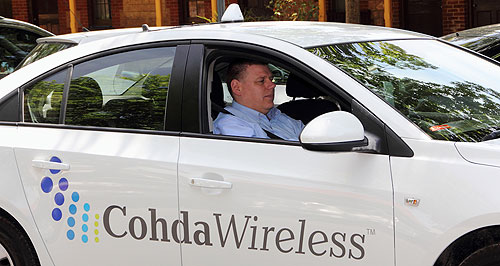News - General News - Autonomous TechnologyCohda leads new trialStates bound: Cohda Wireless CEO Paul Gray says the deal to supply software and hardware for a new US trial will boost the Adelaide-based company. Adelaide company chosen to supply hardware for important new US connected car trial29 Mar 2016 By IAN PORTER SOUTH Australia’s Cohda Wireless has been chosen as the sole provider of software and hardware for a critical new trial of connected vehicle technology in the American state of South Carolina. The trial will be conducted by Clemson University and will feature roadside hardware installed along a 16 kilometre stretch of Interstate 85 near the university’s Greenville campus. The results obtained are expected to provide important input for the proposed mandating of connected vehicle technology in 2020, according to Clemson University school of mathematics associated professor Jim Martin. Clemson's decision to use only Cohda equipment is an endorsement of the position Cohda’s technology holds in the intelligent transport systems arena. Cohda’s technology is the only one that can detect vehicles around blind corners whereas competing dedicated short-range communications (DSRC) systems are only line-of-sight systems. “This further extends Cohda’s leading position as a provider of innovative connected vehicle technology,” Cohda chief executive Paul Gray said. In recent years, most trials have involved several suppliers although Cohda has supplied about 60 per cent of the equipment used in trials around the world. Associate professor Jim Martin said there were two reasons why Cohda’s equipment was selected. “Firstly, Cohda’s Mk5 on-board unit and roadside unit performed well in validation tests and, secondly, because the support provided by Cohda to help us get our equipment up and running was outstanding.” he said. The Clemson trial is being conducted on behalf of the National Science Foundation in the United States and is part of a White House project called US Ignite. This program encourages and helps create future internet applications that will bring significant public benefit. The US department of transport has already signalled that it is likely all vehicles will have to be fitted with DSRC systems by 2020. This will enable all vehicles to communicate with each other and with surrounding infrastructure, reducing the number of road crashes and saving lives. The project is separate from the programs being funded by the National Highway Traffic Safety Administration, another Cohda spokesperson, Bernd Luebben, said by email from Munich. Mr Luebben said he believed the NHTSA, the department of transport and other agencies were consulted about the aims and general direction of the Clemson trial before it was commissioned by US Ignite and the National Science Foundation. “Our goal is to have Clemson become one of the future US Department of Transport connected vehicle pilot sites,” Mr Luebben said. He said the Clemson trial would lay the groundwork for the proposed mandating of connected vehicle technology in 2020. General Motors has committed to installing Cohda’s technology starting with the 2017 Cadillac CTS. Cohda collaborates with US company NXP to produce the RoadLink chipset, which is then incorporated into a module by Delphi, a Tier One supplier to GM.  Read more4th of March 2016  Connectivity as important as autonomy: forumAutomated vehicles need P2P, internet and infrastructure connectivity to succeed4th of November 2015  Cohda steps aheadSouth Australian leader improves its vehicle-to-vehicle technology |
Click to shareGeneral News articlesResearch General News Motor industry news |
















Facebook Twitter Instagram